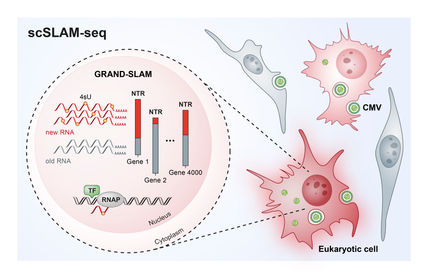Tracking Down Genetic Influences on Brain Disorders
New findings will help to identify the genetic causes of brain disorders: researchers at the Universities of Basel, Bonn and Cologne have presented a systematic catalog of specific variable locations in the genome that influence gene activity in the human hippocampus.
Individual differences in gene regulation contribute to the development of numerous multifactorial disorders. Researchers are therefore attempting to clarify the influence of genetic variants (single-nucleotide polymorphisms, or SNPs) on gene expression and on the epigenetic modification of regulatory sections of the genome (DNA methylation). The German–Swiss team has now studied the genetic determinants of gene expression, as well as the process of DNA methylation in the human hippocampus.
Three million genomic locations analyzed
The researchers have presented an extensive catalog of variable locations in the genome – that is, of SNPs – that affect the activity of genes in the human hippocampus. Specifically, they have analyzed the influence of more than three million SNPs, spread throughout the genome, on activity in nearby genes and the methylation of adjacent DNA sections.
The special thing about their work is that the researchers used freshly frozen hippocampus tissue obtained during surgery on 110 treatment-resistant epilepsy patients. They extracted DNA and RNA from the hippocampus tissue and, for all of the obtained samples, used microchips to determine several hundred thousand SNPs, as well as the degree of methylation at several hundred thousand locations (known as CpG dinucleotides) in the genome. Among other analyses, they measured the gene expression of over 15,000 genes using RNA microchips.
Development of schizophrenia
The researchers also demonstrated the preferred areas in which variably methylated CpG dinucleotides appear in the genome, and they were able to assign these to specific regulatory elements, revealing a link to brain disorders: a significant proportion of the identified SNPs that individually influence DNA methylation and gene expression in the hippocampus also contribute to the development of schizophrenia. This underlines the potentially significant role played by SNPs with a regulatory effect in the development of brain disorders.
The study’s findings will make it considerably easier to interpret evidence of genetic associations with brain disorders in the future. Of the SNPs involved in the development of brain disorders, many of those identified in recent years are located in the non-coding part of the genome. Their functional effect in cells is therefore largely unclear.
An important factor in the project’s success was the close cooperation between the Universities of Basel, Bonn and Cologne. This collaboration is supported by the IntegraMent Consortium, which is sponsored by Germany’s Federal Ministry of Education and Research and coordinated by Professor Markus Nöthen of the University of Bonn.
Original publication
Other news from the department science

Get the life science industry in your inbox
By submitting this form you agree that LUMITOS AG will send you the newsletter(s) selected above by email. Your data will not be passed on to third parties. Your data will be stored and processed in accordance with our data protection regulations. LUMITOS may contact you by email for the purpose of advertising or market and opinion surveys. You can revoke your consent at any time without giving reasons to LUMITOS AG, Ernst-Augustin-Str. 2, 12489 Berlin, Germany or by e-mail at revoke@lumitos.com with effect for the future. In addition, each email contains a link to unsubscribe from the corresponding newsletter.
Most read news
More news from our other portals
Last viewed contents
List_of_subjects_in_Gray's_Anatomy:_X._The_Organs_of_the_senses_and_the_Common_integument
Anomer
Wolff's_law
Chemosensory_protein






















































